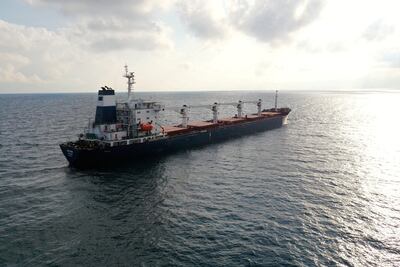The first shipment of grain to leave Ukraine under a deal to unblock the country's exports after Russia's invasion has ended up in Syria, satellite images show.
The arrival of the cargo ship Razoni in Syria comes after the government in Kyiv said its departure from the port of Odesa showed Ukraine could safely ship out its barley, corn, sunflower oil and wheat to the world amid global food price rises.
Pictures from Planet Labs PBC analysed by the Associated Press showed the Sierra Leone-flagged Razoni arriving in Syria’s port of Tartus on Monday. The vessel was next to the port’s grain silos, where cargos to supply the nation are unloaded.
The Razoni’s Automatic Identification System tracker was turned off on Friday, when it was just off the coast of Cyprus, according to data from ship-tracking website MarineTraffic.com.
Ships are supposed to keep their AIS trackers on, but those heading to Syrian ports routinely turn them off to hide their movements.
The Razoni, loaded with 26,000 tonnes of corn, left Odesa on August 1. It was the first to leave a Ukrainian-controlled port in the country since Russia launched the war in February.
Syria has already received Ukrainian grain taken from Russian-occupied territory since the invasion.
The Razoni could be identified in the satellite image by its colour, length and width, as well as the four large white cranes on its deck.

Samir Madani, co-founder of the oil-shipment website TankerTrackers.com and an expert on following ships via satellite images, also identified the vessel from the image.
The Financial Times newspaper first reported on the satellite image.
As part of the deal, a UN co-ordination centre in Istanbul staffed by Turkey, Russia and Ukraine oversees the shipments to make sure they safely travel through the Black Sea, which has mines in some areas and has seen combat during the conflict.
Lebanon was the Razoni’s presumed destination. But Lebanese media reported that after a months-long delay due to the war in Ukraine, the merchant who had bought the shipment no longer wanted it.
The vessel sat off Mersin, Turkey, before heading to Syria.
The UN Joint Co-ordination Centre said that “after outbound vessels clear inspection in Istanbul, the JCC ceases monitoring them”.
“The cleared vessels proceed then to their final destinations, whatever those may be,” it said.
On Tuesday, the Ukrainian Embassy in Beirut referred to an earlier statement that the Razoni’s cargo was no longer Kyiv’s responsibility.
“Our task has been to reopen seaports for grain cargo and it has been done,” it said.
In Washington, State Department spokesman Ned Price said the US did not “determine who buys the grain shipments or their final destinations”.
“What matters most to us are a couple things,” Mr Price said. “One: That Ukraine is appropriately compensated for the grain, the foodstuff, for the crops that it is in this case providing. And that the food gets to where it is needed most.”
An official at the Tartus port declined to comment. Syria’s mission to the UN did not respond to a request for comment.
Tartus, on the Mediterranean Sea, lies about 320 kilometres north-west of Syria’s capital, Damascus.
Ukraine's ties with Syria severed
Syria remains sanctioned by the West over killing and abuses of civilians during the civil war, though food supplies have been exempted by the West.
Russian military support has been key to Syrian President Bashar Assad remaining in power. Syria has recognised the Russian-backed breakaway eastern Ukrainian regions of Donetsk and Luhansk as sovereign entities, leading to Kyiv severing diplomatic ties with Damascus.
Since earlier this year, ships have carried Ukrainian foodstuffs from Russian-occupied territory to Syria.
In May, satellite images showed the Russian-flagged Matros Pozynich at a dockside in Latakia, Syria. Ukraine said the ship carried 27,000 tonnes of its grain that had been stolen by Russia and offered to Egypt, which refused to take the cargo.

